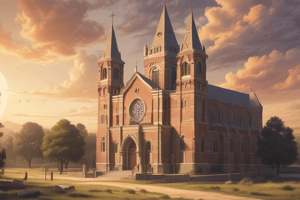Podcast
Questions and Answers
What does the Greek word 'ekklēsia' primarily signify?
What does the Greek word 'ekklēsia' primarily signify?
- A historical event
- A sacred text
- A religious gathering (correct)
- A place of worship
Which of the following meanings is NOT associated with the term 'Church' in Christian usage?
Which of the following meanings is NOT associated with the term 'Church' in Christian usage?
- A specific denomination (correct)
- The liturgical assembly
- The universal community of believers
- The local community
What is the significance of Christ in relation to the Church according to the provided content?
What is the significance of Christ in relation to the Church according to the provided content?
- Christ's teachings are secondary to Church traditions.
- Christ is a historical figure without influence on the Church.
- Christ is the head of the Church's people. (correct)
- Christ is the foundation of various denominations.
Which of the following is NOT described as an image used in Scripture to illustrate the Church?
Which of the following is NOT described as an image used in Scripture to illustrate the Church?
What does the term 'Kyriake' imply in relation to the word 'Church'?
What does the term 'Kyriake' imply in relation to the word 'Church'?
In what way does the Church derive its life according to the content?
In what way does the Church derive its life according to the content?
What assembly does 'the Church' recognize itself as heir to?
What assembly does 'the Church' recognize itself as heir to?
What role does the Church play in the gathering of people according to the provided content?
What role does the Church play in the gathering of people according to the provided content?
What role does Christ play in relation to the Church?
What role does Christ play in relation to the Church?
How is the Church described in relation to God's fields?
How is the Church described in relation to God's fields?
In what way is the Church established according to the text?
In what way is the Church established according to the text?
What metaphor is used to describe the Church in terms of its foundation?
What metaphor is used to describe the Church in terms of its foundation?
What does the term 'Jerusalem which is above' signify about the Church?
What does the term 'Jerusalem which is above' signify about the Church?
What is the significance of the Church's genesis in the Father’s design?
What is the significance of the Church's genesis in the Father’s design?
How is the historical significance of the Church conveyed?
How is the historical significance of the Church conveyed?
What does the 'household of God in the Spirit' symbolize?
What does the 'household of God in the Spirit' symbolize?
What is described as the Church's ultimate completion?
What is described as the Church's ultimate completion?
What metaphor does the Church's structure share with the New Jerusalem?
What metaphor does the Church's structure share with the New Jerusalem?
Flashcards are hidden until you start studying
Study Notes
Definition and Origin of the Church
- The term "Church" comes from Latin "ecclesia" and Greek "ek-ka-lein," meaning "to call out of," signifying a convocation or assembly.
- "Ekklesia" was often used in the Greek Old Testament for the assembly of the Chosen People, especially at Mount Sinai where Israel received the Law.
Identity of the Church
- Early Christian believers identified themselves as heirs to this assembly, understanding "Church" as God's gathering of people globally.
- "Kyriake," the Greek word related to "Church," translates to "what belongs to the Lord."
Community and Assembly
- In Christian context, "Church" encompasses the liturgical assembly, local communities, and the universal community of believers, with these meanings being interdependent.
- The Church thrives on the word and Body of Christ, embodying Christ's presence.
Scriptural Imagery of the Church
- Scriptural images and figures highlight the mystery of the Church, emphasizing its status as the People of God, centered on Christ as their head.
- Imagery includes:
- The flock with Christ as the Good Shepherd.
- Cultivated land where the ancient olive tree symbolizes reconciliation.
- A building constructed upon the cornerstone of Christ, representing solidity and unity.
Symbolism of the Church
- Church as a sheepfold: Open only through Christ, who nurtures and leads the believers.
- Church as a cultivated field: The olive tree's roots represent prophets, emphasizing the growth and unity of Jews and Gentiles through Christ.
- Church as the building of God: Imagery of a household of God, with living stones symbolizing believers forming the holy temple.
Theological Reflection
- The Church is referred to as "our mother" and the "spotless spouse" of the Lamb, highlighting the intimate relationship between Christ and the Church.
- The Church's origins stem from the divine plan of the Holy Trinity, with an ultimate purpose to share in God's divine life.
Historical Development
- The Church's formation reflects God's design, gradually materializing throughout human history and foreshadowed since the beginning of the world.
- Scriptural preparation involved the history of Israel, with the Holy Spirit's outpouring marking the establishment of the Church in the last age of the world.
Studying That Suits You
Use AI to generate personalized quizzes and flashcards to suit your learning preferences.




